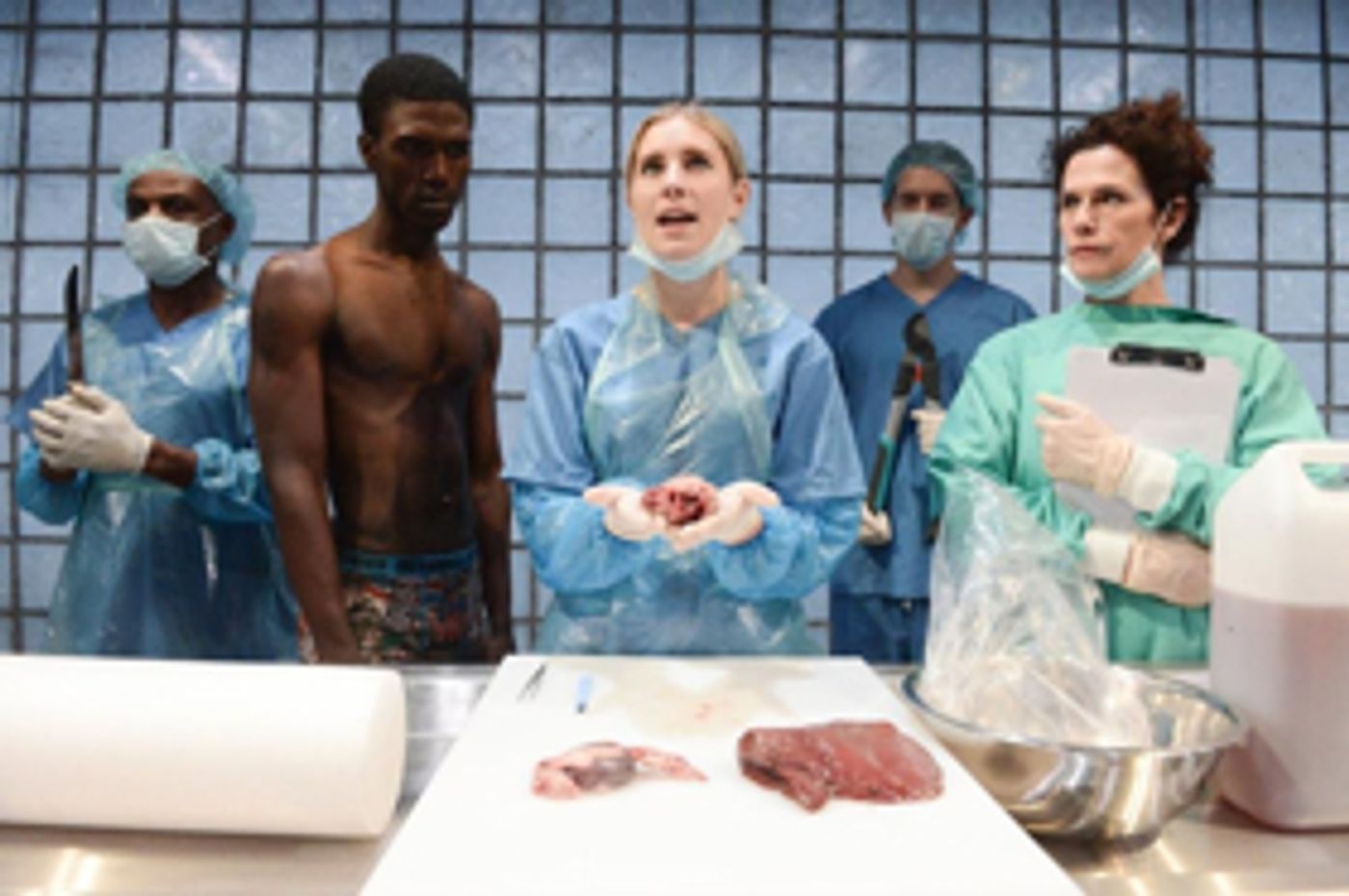Review: THE STRANGE DEATH OF JOHN DOE, Hampstead Theatre

![]() We sit in a pathology lab, the stainless steel of gurneys and instruments shining under the cold strip lighting, as the scientists go about their gruesome work, oiled with the gallows humour one would expect. Number 5 gets bumped up the queue as the police are after information about it - the body (or is it person) apparently falling from a plane into a suburban garden on the Heathrow flight path (the owner of which is already demanding compensation for ruined flowerbeds).
We sit in a pathology lab, the stainless steel of gurneys and instruments shining under the cold strip lighting, as the scientists go about their gruesome work, oiled with the gallows humour one would expect. Number 5 gets bumped up the queue as the police are after information about it - the body (or is it person) apparently falling from a plane into a suburban garden on the Heathrow flight path (the owner of which is already demanding compensation for ruined flowerbeds).
I found echoes of Michel Foucault's work on both bureaucracies and on the human body as forms are filled in to categorise that which needs to be categorised and a person is reduced to their component parts, ribs crunchingly levered open, heart and vital organs extracted and weighed, blood drained and analysed. There's just the bantz between the workers to remind us that humanity is more than the sum of its (literal) parts.
But Fiona Doyle changes all that by writing the character back into the cadaver. Moving slowly and silently, Number 5 becomes a ghostly presence in the lab, invisible to the workers but spooking them as he silently demands our attention and (subconsciously) theirs, John Doe is the name given to an unidentified victim of homicide in some jurisdictions, but this John Doe is alive and insistent - at least to us. He is a man not a number.
We learn of his backstory, how he ended up climbing into the wheel arch of a jet flying from Luanda to London, the desperation that drove him to take such a terrifying risk. It's all the more shocking because Ximo (that is his name) was a domestic worker in Cape Town, a wealthy city in a wealthy country, who stood between an abusive husband and his wife.
Her gratitude and guilt led her to suggest a routine journey for a white woman of privilege, but an impossible one for a black man with no passport, an immigrant even in his own country. Ximo was doomed for the foolishness of believing he was an equal to his "mistress". In 2018.
The acting is uniformly excellent, the comic timing as precise as the pathos is affecting. Abigail Thaw and Rhashan Stone deliver a pair of investigating police officers who could easily fall into stereotypes, but retain the hard edge of the script without us ever losing sight of their priorities and their flaws.
Nick Hendrix moves effortlessly from one role to another, characters instantly established by posture and tone of voce. Charlotte Bradley's matronish laboratory teacher/manager gets plenty of laughs with her no-nonsense tough love and Maynard Eziashi and Damola Adelaja deliver some fine comic turns too.
The play hinges on the performances of Callie Cooke and Benjamin Cawley, who are in award nomination form as the central relationship in the play.
Cawley is transfixingly still, his character reduced (literally) to its physical presence in the lab, but blazingly alive in flashback, as we see his intelligence and decency thwarted by his being viewed as a set of limbs and torso, labouring to earn money, present in places he should not be and ultimately sliced and diced only for the coroner to summarise a life in 60 seconds of impersonal stock remarks. The parallels with the way slaves were transported and treated in the Triangular Trade are obvious and uncomfortable.
Cooke is as good as she was in Firebird a couple of years ago, in the roles of Anna, the student pathologist and Rae, the woman who employed Ximo and promised him more than she could deliver. As the play unfolds, we realise that these two characters are playing the same part in Ximo's life - Rae taking a metaphorical pair of secateurs to Ximo's fragile existence as a migrant worker and Anna taking a literal pair of secateurs to his fragile ribs in the autopsy.
Cooke allows us to see the way Rae/Anna destroy Ximo without ever forcing such conclusions on us - a rare example of double-casting that makes sense dramatically as well as financially.
There's much that's good, even excellent about this new play, but it has its flaws. The closing 30 minutes or so sees the pace drop and a little more philosophising than would be ideally the case. The (black) detective in an existential crisis storyline works well as a complement to Ximo's story, but its resolution feels perfunctory - the subplot proving distracting and unsatisfactory.
That said, there's much to think about in this play and much to enjoy, not least the wonderfully choreographed movement by the late Scott Ambler, to whom the production is dedicated - and for whom it is a fitting memorial.
The Strange Death of John Doe continues at Hampstead Theatre until 30 June.
Photo Robert Day
Reader Reviews
Videos

